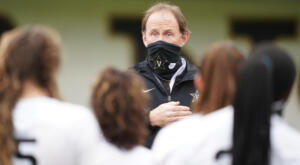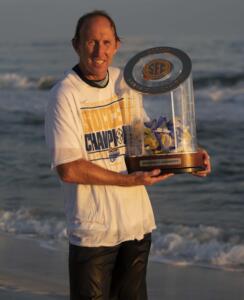Play Like You Mean It
by Graham HaysFor Darren Ambrose, building a premier soccer program starts with a passion for the game
NASHVILLE, Tenn. — As an otherwise unremarkable women’s soccer practice at the University of Pennsylvania came to a close more than a decade ago, Darren Ambrose was frustrated. Maybe even ticked off.
The Ivy League program’s coach at the time, Ambrose wasn’t mad about a defensive miscue, an errant pass or some other sloppy passage of play. He wasn’t worn down by defeats—the Quakers nearly won the league that season. He instead told his players that he didn’t understand them. Specifically, he didn’t understand why they so often responded to scoring goals, even practice goals, with all the enthusiasm of crossing entries off a list of chores.
“I remember Darren giving us grief that we don’t know what it means to be passionate about soccer,” says Erin Beck, who was a captain at the time. “He would reminisce about what soccer meant where he’s from. And he’d say, ‘You need to celebrate. You need to love this game with every ounce of you.’
“And that included our celebrations after we score.”
Soccer has to be about something more than a result—it’s much like life in that respect.
For residents of an English industrial city, the local soccer team is more than the games it wins. To a woman stretching antiquated social norms just to be there, a ticket is more than a seat in the stands. And to a young man moving on from a childhood dream, attending college in the United States was about more than playing soccer. Time and again, Ambrose experienced a world in which the passion a sport inspired told more compelling stories than the scoreboard ever could.
Then he took those experiences and built one of college soccer’s most improved programs.
Now in his sixth season at Vanderbilt, Ambrose has transformed a faltering afterthought into a winner. The pandemic stretched the current season beyond its traditional fall confines and into the spring, but Vanderbilt earned its place last November in the upcoming NCAA tournament when it won the SEC tournament for the first time in 26 years. This is the fourth consecutive NCAA tournament appearance for the Commodores—their longest streak since the 1990s.
 In a soccer landscape long dominated by the ACC and the Pac-12, Vanderbilt is still gaining a foothold. But the university that does not compromise its mission to prepare students for the world found a coach who believes that larger mission is the root of success.
In a soccer landscape long dominated by the ACC and the Pac-12, Vanderbilt is still gaining a foothold. But the university that does not compromise its mission to prepare students for the world found a coach who believes that larger mission is the root of success.
On his path to leading champions, Ambrose shaped a program that is about more than winning championships.
“I think it was just a matter of time until they got the right person that really understood the landscape and understood the type of young woman that would be a really good fit at Vanderbilt,” says longtime Duke and former Vanderbilt coach Robbie Church. “There was no question in my mind Darren was going to be that person. I’m not surprised at all that he’s got his teams highly ranked and winning championships in a really good league.
“I would be more surprised if he hadn’t succeeded.”
Early Devotion
It isn’t surprising that soccer is the lens through which Ambrose most comfortably sees the world. It isn’t his only interest, and it wasn’t the only sport he ever played. But soccer surrounded him and shaped his world from his earliest days.
Ambrose grew up near the northern industrial city of Sheffield—squarely in England’s soccer heartland. Draw a line barely 70 miles long and you connect the home stadiums of teams in Liverpool, Manchester and Sheffield. It is a region where, as one of his friends remarked to him, people still work all week to afford their season tickets on the weekends. As it ever was.
“No disrespect to any sport here—there are passionate fans here too,” Ambrose says. “And I’ve been to many, many sporting events, including the World Cup final in 1994. But there is just something different about being on a terrace, shoulder to shoulder with people who don’t just support the team, they live the sport and live through their team. It’s the essence of belonging to a common institution.”
He wanted nothing more than to grow up to be a professional player, and he came closer than most. After a boyhood tryout, he played goalkeeper for youth teams affiliated with Sheffield United. The Blades, as United is known, are one of two teams that divide the city, allegiances passed down like religion from one generation to the next. Indeed, before he ever played for United, he attended games at Bramall Lane, which has been the team’s home in one form or another since 1889.
His parents weren’t rabid fans, at least by the standards of the region. It was instead an aunt, Liz Cooper, and her friends who took him to his first game and many more after that.
Women were rare inside Bramall Lane and at the pubs and working men’s clubs that filled before and after games back then; England is a latecomer to soccer equality. The sport’s domestic governing body effectively blocked the development of women’s soccer until 1971. Despite a devotion to the sport and Sheffield United that continues to this day, for instance, Cooper said she was 19 years old when she first had an opportunity to play for an organized amateur team.
For his part, Ambrose was too busy marveling at the wide expanse of green grass and the songs fans bellowed in perfect harmony to think much about the unique nature of his company. He just knew his aunt was as devoted to the Blades as he was. She gave him access to that world of Saturday afternoons among like-minded congregants in the pubs and terraces.
Cooper laments that her memory isn’t what it once was. She doesn’t remember the time, for instance, that a police horse collided with their car and knocked off a rear-view mirror in a sea of unruly Millwall fans. (At least that’s how Ambrose tells the story.) But she does have the letter that Ambrose wrote to her not so long ago, the one that begins with him writing, “Without you I don’t know if my love of soccer would exist.”
It goes on to detail memories of their trips to Bramall Lane, and it closes with these words:
What makes this seem so much more special today is that at that time, as you know, football wasn’t a women’s game. It was predominantly men and boys in the pubs and in the stands. But I was proud to go with two or three women to Bramall Lane. Ironically, women’s football has become my career, and it all started with you and Sheffield United.
His own aspirations to follow in the footsteps of childhood heroes ran up against the cutthroat world of soccer development in England at the time. Following that path meant an almost Dickensian system of apprenticeship—cleaning cleats, mopping floors and performing other menial tasks while hoping to make an impression in training. It meant a full-time commitment.
Neither of Ambrose’s parents attended university, as was the norm at the time, but obtaining a degree was one of his goals. Yet higher education and the upper rungs of the soccer ladder were all but mutually exclusive in that world.
Burned out on the game at that elite level, and unable to reconcile his athletic and academic dreams, he backed away from soccer. He still played on a semi-pro team on the weekends, alongside mostly older men—people who worked in factories or office jobs but still sought the competition and camaraderie of the game. It was only there, through a chance acquaintance, that he learned about an opportunity to come to the United States and play soccer at what is now the University of South Carolina Upstate.
He assumed he would get a degree in something business-related and return home. He instead discovered a way to stay in the game through coaching, first as an assistant at Rhodes College, Connecticut and Florida State and then as a head coach at Penn by the time he turned 30.
Then in 2015, he became women’s soccer’s sixth head coach at Vanderbilt. A postseason regular in the 1990s and competitive in the early 2000s, the Commodores were adrift by the time Ambrose arrived. But to him, it was an ideal project. Vanderbilt was a place with all the competitive benefits of one of the nation’s premier athletic conferences but also a pool of student-athletes receptive to the same ideas that led him along the path from Sheffield to Nashville.
“I like being around kids that challenge you,” Ambrose says. “There’s no fooling these kids. There’s no fooling the kids at Penn, there’s no fooling the kids at Rhodes. They’re sharp, they’re motivated and they’re driven. Who doesn’t want to be around those kinds of kids every day? The attraction to it is they challenge you, they force you to be on your toes.”
Soccer With A Purpose
When Simone Charley, BA’17, MA’18, heard that Penn student-athletes had gotten an earful about their insufficient goal celebrations, the former Vanderbilt star started to laugh.
She didn’t know that particular song, as it were, but she knew the genre. Ambrose is always focused on the journey, whether that means enjoying goals or not stressing the moment.
 When the Commodores reached the SEC tournament in 2015, their first postseason trip of any kind in five years, Charley and her teammates expected an arduous practice when they arrived in Orange Beach, Alabama, ahead of their first game. This was the postseason, after all. A coach as admittedly intense as Ambrose would surely turn it up a notch for the postseason. They would practice every possible scenario and dive deep into tactical minutia.
When the Commodores reached the SEC tournament in 2015, their first postseason trip of any kind in five years, Charley and her teammates expected an arduous practice when they arrived in Orange Beach, Alabama, ahead of their first game. This was the postseason, after all. A coach as admittedly intense as Ambrose would surely turn it up a notch for the postseason. They would practice every possible scenario and dive deep into tactical minutia.
Instead they spent the better part of an hour that first practice playing a game that involved trying to head balls into a trash can. They joked. They laughed. And they relaxed, shedding the nervousness that came with their literal and figurative new surroundings.
They didn’t win the tournament that year, but they upset Georgia in their first game.
After Ambrose was hired, Charley at first only heard stories about her new coach. Now with Portland Thorns FC in the National Women’s Soccer League, Charley was at that time a first-team All-SEC pick and Vanderbilt’s most decorated player. But she wasn’t around for his early practices, spending that spring as an All-American triple jumper on the track and field team.
All she knew about the new guy were the stories her roommate told about his high standards, hard workouts and the lingering traces of an accent. By the time the fall season rolled around and she returned to the soccer field, she was more than a little unsure how she would fare.
And indeed, Charley made enough first-half miscues in one game early in that first season to draw the brunt of Ambrose’s ire at halftime. He is not Bobby Knight, but anyone who plays for him knows those moments. By his own telling, there often isn’t any “finesse” about his delivery.
Ambrose had also instituted a practice that first year that he brought with him from Penn. Each week, student-athletes had lunch with someone else on the team. Sometimes with a teammate, sometimes a coach, all supposedly matched by random draw. But Charley was hardly surprised to find that her match the week after her miscues was her head coach.
She expected lunch to serve as an excuse for further admonishment. It wasn’t. The miscue was forgotten. He wanted to know how she was doing with life away from the field. He asked what she wanted to do in life whenever—and at whatever level of the sport—she played her final game. As she put it, he wanted to know what she was passionate about.
Strategy and tactics are part of Vanderbilt’s success story. Ambrose is more tactician than philosopher. The former goalkeeper’s teams will always be strong and organized at the back and defend as a group. In 2019, Vanderbilt ranked 25th nationally in goals-against average. Last fall, the Commodores were fourth in the SEC in the same measure. But Ambrose will be the first to say he isn’t some savant who outwits his hapless peers at every turn.
He knows the game and what he believes in. He teaches it well. But mostly, he knows people.
Despite his limited experience as a head coach, Ambrose was immediately successful at Penn. He inherited talent and coached them the same way he was coached on that semi-pro team in Sheffield. Which is to say, hard. The factory workers and laborers he played alongside back in England didn’t sacrifice their scarce free time to lose. And it worked at Penn for a time.
It worked until, much to his surprise, it didn’t. A couple of poor seasons provoked, if not a crisis of confidence, then at least some serious self-reflection. He hadn’t built a culture. He’d been too transactional. He’d instilled a brand of soccer that wasn’t about much more than the scoreboard.
 That hadn’t worked when he burned out as a player, and it wasn’t working as a coach.
That hadn’t worked when he burned out as a player, and it wasn’t working as a coach.
So on a random Friday one October, he stopped focusing on the Xs and Os that might unlock a win against Cornell. He thought instead about how to use soccer to develop people. That hypothetical October game became an experience a person might use later in life. To this day, seeing his team squander a lead eats at him, but not as much as seeing a player squander her potential.
“He was really the first coach to make me talk about my strengths,” recalls Beck, one of his former captains at Penn. “That seems kind of silly. But I think that’s a good lesson for people at that time in their life. And especially women, who tend to have trouble articulating what their strengths are—even though they have a lot of them.”
The cupboard wasn’t bare when he arrived at Vanderbilt, either. And he pushed those student-athletes hard and achieved early success. Sometimes the conversations with Charley weren’t dialogues about aspirations. Sometimes he chewed her out. And sometimes the team got the grueling practice instead of a light-hearted heading competition.
But there was always a purpose. It was never just about the next victory.
“The thing that I really appreciated was he cared about me as a person,” Charley says. “That was the foundation for me trusting him when he’s critiquing me on the field or holding me accountable for when I’m not performing the way that I should be. I can take that because I know that he actually cares.”
True Passion
Ambrose was in the Nashville airport before the pandemic, having a drink at Tootsie’s while he waited for a flight. The live band started playing “Lucille,” the song first recorded by Kenny Rogers and also memorably performed by Waylon Jennings. Amused by how many of his fellow travelers remained largely oblivious to the music, he called his dad back in England. His dad had dropped out of school as a teenager. He drove a bread truck, ran a machine in a clothing production plant and eventually became a financial advisor who would stand in the rain with an umbrella and a cigar and watch Darren play.
But his dad’s true passion was playing in a country and western band every weekend, bringing the music of Waylon Jennings and others to places like Doncaster, Rotherham and Sheffield.
How strange was it, Ambrose joked on that call, that just about the only person in the airport bar in Music City who knew the lyrics was the one from the small town in northern England.
Maybe not that strange. Not if what he learned along with the lyrics was what it means to pursue a passion, much as he saw a team and a sport inspire those who worked all week to sit in the Bramall Lane stands each weekend. And much as he witnessed a devotion to that team transform his aunt into an agent for social change and a reminder to him that soccer is for everyone.
Passion is filling Bramall Lane whether Sheffield United is soaring into the Premier League or tumbling out of the top division.
Passion is wanting to play Waylon Jennings songs without caring if it’s in a pub in Doncaster or on a stage at the Ryman Auditorium.
It is the reason to celebrate the thrill of a goal without caring if it comes in a midweek practice scrimmage or the College Cup final.
That idea brought Ambrose to Nashville. It could, soon enough, win Vanderbilt a national championship.
— Graham Hays covers Vanderbilt for VUCommodores.com.
Follow him @GrahamHays.
